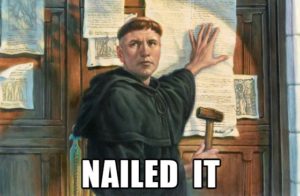 October 31, 2016 marked the 499th anniversary of the beginnings of what we know today as the Protestant Reformation. While most of us know the basics of the Reformation (such as the fact that Martin Luther nailed his 95 theses to the doors of Wittenburg Castle), there is quite a bit about the Reformation that is not as widely known or is even untrue. So, in celebration of Luther’s act, I want to share just a few of these facts with you now.
October 31, 2016 marked the 499th anniversary of the beginnings of what we know today as the Protestant Reformation. While most of us know the basics of the Reformation (such as the fact that Martin Luther nailed his 95 theses to the doors of Wittenburg Castle), there is quite a bit about the Reformation that is not as widely known or is even untrue. So, in celebration of Luther’s act, I want to share just a few of these facts with you now.
- Martin Luther’s intention was not to break away from the Roman Catholic Church. Often, we Protestant’s think that Luther’s act of publishing his theses was his “declaration of independence” from the Catholic Church. The reality is that Luther thought his work would only be read by other Catholic academics and might lead to some reforms within the Church. A break was not his original intent. Indeed, what we might consider Luther’s key doctrine – justification by faith alone – was not included in the theses. However, what Luther wrote struck a nerve and he had what we would call today a “viral post” on his hands.
- There were real differences between the Reformers. Some have wondered why we have such an abundance of Protestant denominations today and whether it would not be better for us all to be together as one. Some of the Reformers, such as Bucer, had that same desire, and the Catholic Church has long used the different denominations as proof that we were wrong to break away because we have brought disunity to the church. However, the differences between Reformers was not minor. For example, Luther, Calvin, and Zwingli all had different views on the presence of Christ in the elements of communion (consubstantiation, real presence, and symbolic presence, respectively), but all agreed that the Catholic doctrine (transubstantiation) was not Scriptural. There were differences on the question of baptism between most Reformers and the Anabaptists. And, of course, how the church structure would be established (polity) led to different denominations forming.
- The Reformation solidified the acceptance of Bible translations in the common language. Though it can be hard for us to believe in an age where we have the Bible in several English translations (as well as numerous other languages around the world), there was a time when the only accepted language for Scripture was Latin, a dead language spoken only by the very well-educated and the clergy. The average person had no direct access to the Word and were not able to read it for themselves. They heard it spoken at Mass, but only in a language they could not understand. When Luther published his translation of the New Testament into German in 1522, the average believer was able to hear and read the Bible in his or her native tongue – and were not martyred for it such as Wycliffe and Huss.
- The Reformation is complete. One of the cries of the Reformers was, “Semper reformanda,” which means, “Always reforming.” There is no doubt God blessed His church through the men of the Reformation, but we must avoid the temptation to assert that what they wrote and developed is the final authority. Likewise, we must resist the temptation to discount what they wrote and developed just because it is old. Calvin himself had no illusions about this: “Such, then, is the holiness of the Church: it makes daily progress, but is not yet perfect; it daily advances, but as yet has not reached the goal” (The Institutes, 4.1.17). We are to be constantly going to the Word of God, just as the Reformers did (think sola Scriptura!), in order to test everything we do as the church. I think John MacArthur phrased it best: “The only true and valid reformation occurs as we align our beliefs, our behavior, and our worship with the Word of God.”
Needless to say, we have much to be thankful for when it comes to the Reformation. Today, we stand on the shoulders of giants, which is a reminder to us of the great responsibility we have to contend earnestly for the faith once for all delivered to the saints (Jude 3) so that subsequent generations may be blessed as we have. Just something to think about…

0 Comments